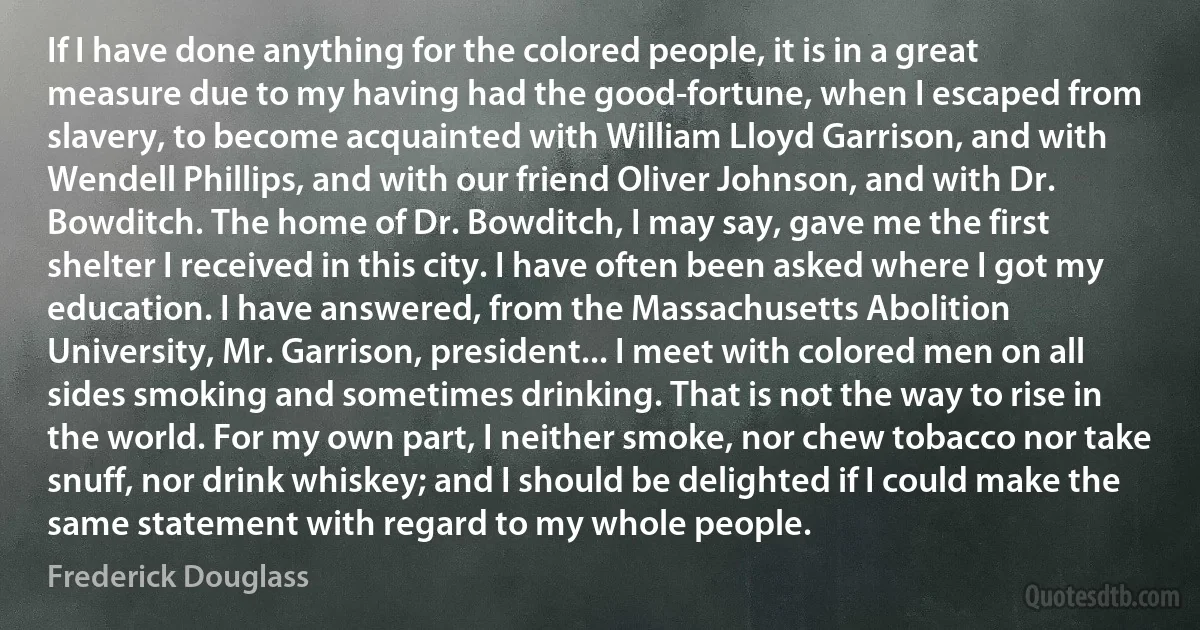
If I have done anything for the colored people, it is in a great measure due to my having had the good-fortune, when I escaped from slavery, to become acquainted with William Lloyd Garrison, and with Wendell Phillips, and with our friend Oliver Johnson, and with Dr. Bowditch. The home of Dr. Bowditch, I may say, gave me the first shelter I received in this city. I have often been asked where I got my education. I have answered, from the Massachusetts Abolition University, Mr. Garrison, president... I meet with colored men on all sides smoking and sometimes drinking. That is not the way to rise in the world. For my own part, I neither smoke, nor chew tobacco nor take snuff, nor drink whiskey; and I should be delighted if I could make the same statement with regard to my whole people.
Frederick DouglassRelated topics
abolition anything chew city colored done drinking drink due education friend garrison great having home men measure meet nor people president rise say should shelter smoke take tobacco way whiskey world Massachusetts johnson Lloyd Phillips WilliamRelated quotes
To the Whigs of the seventeenth century we owe it that we have a House of Commons. To the Whigs of the nineteenth century we owe it that the House of Commons has been purified. The abolition of the slave-trade, the abolition of colonial slavery, the extension of popular education, the mitigation of the rigour of the penal code, all, all were effected by that party; and of that party, I repeat, I am a member. I look with pride on all that the Whigs have done for the cause of human freedom and of human happiness. I see them now hard pressed, struggling with difficulties, but still fighting the good fight. At their head I see men who have inherited the spirit and the virtues, as well as the blood, of old champions and martyrs of freedom...While one shred of the old banner is flying, by that banner will I at least be found.

Thomas Babington Macaulay
I shall never cease from the practice and teaching of philosophy, exhorting anyone whom I meet after my manner, and convincing him, saying: O my friend, why do you who are a citizen of the great and mighty and wise city of Athens, care so much about laying up the greatest amount of money and honor and reputation, and so little about wisdom and truth and the greatest improvement of the soul, which you never regard or heed at all? Are you not ashamed of this? And if the person with whom I am arguing says: Yes, but I do care: I do not depart or let him go at once; I interrogate and examine and cross-examine him, and if I think that he has no virtue, but only says that he has, I reproach him with overvaluing the greater, and undervaluing the less. ...For this is the command of God, as I would have you know...

Socrates
Mr. Douglas incessantly remembers to inform us in every speech he has made for a year past that, when the Constitution was formed, all the thirteen States but one recognized slavery by law; but he incessantly forgets to add that Pennsylvania in 1780 passed an act for the gradual abolition of slavery which freed everybody born in the State after its passage; that one day later Massachusetts decided that her Bill of Rights abolished slavery forever; that in 1784 Connecticut followed Pennsylvania, and Rhode Island at about the same time; that in 1792, soon after the Constitution was formed. New Hampshire, under her Bill of Rights, Vermont, by express assertion in her Constitution, New York in March, 1799, and New Jersey in 1804, gradually abolished slavery.

George William Curtis
The concept of disease is fast replacing the concept of responsibility. With increasing zeal Americans use and interpret the assertion "I am sick" as equivalent to the assertion "I am not responsible": Smokers say they are not responsible for smoking, drinkers that they are not responsible for drinking, gamblers that they are not responsible for gambling, and mothers who murder their infants that they are not responsible for killing. To prove their point - and to capitalize on their self-destructive and destructive behavior - smokers, drinkers, gamblers, and insanity acquitees are suing tobacco companies, liquor companies, gambling casinos, and physicians.
Can American society survive this legal-psychiatric assault on its moral and political foundations?

Thomas Szasz
In like manner the Reverend Dr. William A. Smith, President of the Randolph-Macon College in Virginia, in his work upon the Philosophy and Practice of Slavery, deliberately repudiates Mr. Jefferson's view of slavery as a 'grossly offensive error', and attributes the anti-slavery movement to him – which is as wise as to attribute the motion of the earth to Galileo. Judge Wayne, in his late charge at Savannah upon the law against the slave-trade, confirms Mr. Stephens's statement. And, as if to establish it by the most unexpected testimony, Mr. Edward Everett, in his late discourse upon Daniel Webster, said, 'In common with all, or nearly all, the statesmen of the last generation, he believed that free labor would ultimately prevail throughout the continent'.

George William Curtis
